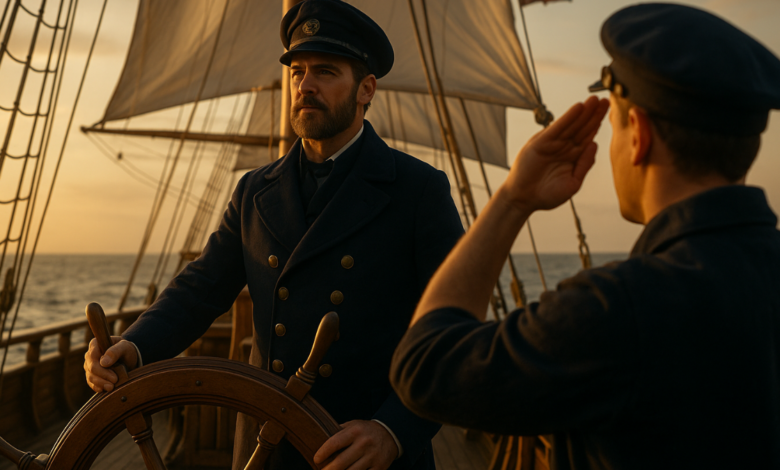Aye Captain: Meaning, Origins, and Modern-Day Use

Discover the meaning, origins, and modern use of the phrase aye captain. Learn its nautical roots, pop culture impact, and how it remains a playful yet powerful part of language.
When people hear the phrase aye captain, they often imagine sailors, pirate adventures, or military officers aboard grand ships. This small but powerful phrase carries centuries of history, cultural depth, and playful modern usage. Though short in form, aye captain has left its mark across literature, naval traditions, movies, and even everyday conversation. It’s more than a sailor’s response; it’s a phrase filled with loyalty, recognition, and a nod to discipline wrapped in familiarity.
In this article, we’ll dive deep into the origin of aye captain, its nautical background, its rise in pop culture, and how it continues to remain alive in the modern world. Whether you’ve shouted it while joking with friends, heard it in movies like Pirates of the Caribbean, or read it in classic seafaring novels, this phrase carries both charm and authority.
The Origins of Aye Captain
The roots of aye captain trace back to naval and maritime traditions. The word “aye” itself is an old English term that means yes. While in modern English, people say “yes” or “yeah,” sailors and officers relied on “aye” to confirm orders clearly. This way, when a command was given, there was no confusion about whether the order was heard or accepted.
When paired with the title captain, it became a respectful acknowledgment of authority. Saying aye captain was not just about agreement; it was about showing loyalty and readiness to carry out duties. The seas were unforgiving, and discipline ensured survival. Thus, such phrases became a part of maritime culture, woven into the very fabric of life at sea.
Nautical Significance of Aye Captain
In nautical terms, communication was critical. A simple misheard word could lead to disaster, from misaligned sails to navigational errors. By responding with aye captain, sailors confirmed not only that they heard their leader but also that they understood the command.
This distinction mattered deeply on ships. For example, “yes” could mean acknowledgment, but “aye” meant commitment to action. The captain held ultimate responsibility for the ship, so their word was law. Aye captain carried the weight of obedience, clarity, and respect, ensuring smooth coordination during storms, battles, and voyages.
Aye Captain in Literature and Classic Stories
The literary world embraced the richness of aye captain as early as the 18th and 19th centuries. Writers who depicted life at sea naturally incorporated it into their works. For instance, in tales of whaling ships, pirate crews, and Royal Navy expeditions, the phrase added authenticity and rhythm to dialogue.
One of the most famous literary figures associated with captains is Captain Ahab from Moby-Dick. While the exact phrase aye captain may not appear in the same way we use it today, variations of “aye” and respectful responses reflect the same cultural significance. The phrase’s timelessness allows it to cross generations, surviving in novels, plays, and poetry that celebrate the mystery of the sea.
Aye Captain in Popular Culture and Movies
Pop culture has given aye captain a spotlight that few nautical terms can rival. From children’s cartoons to blockbuster films, the phrase carries a blend of authority and humor.
- Pirates of the Caribbean – Pirates shout aye captain to Jack Sparrow in moments of loyalty, sometimes sincerely and sometimes with comic exaggeration.
- SpongeBob SquarePants – Perhaps one of the most famous modern uses comes from SpongeBob himself, who gleefully shouts aye aye captain as he prepares for adventures.
- Star Trek – Although the words differ, Captain Kirk’s crew often responds with similar affirmations, echoing the tone and respect embedded in aye captain.
The enduring popularity of the phrase in pop culture reflects its flexibility. It can be serious, comedic, or even sarcastic, depending on the context.
Modern Usage of Aye Captain in Everyday Speech
Today, aye captain has moved far beyond ships and oceans. People use it in casual conversation to signal agreement in a playful way. For example, when someone reminds you to complete a task, you might reply with aye captain to lighten the moment while still showing acknowledgment.
It’s also popular in workspaces, gaming communities, and group activities. Saying aye captain instantly sets a tone of camaraderie. It acknowledges authority but does so with humor and energy, making it a favorite among friends and coworkers alike.
Symbolism Behind Aye Captain
The phrase symbolizes more than obedience—it represents unity, trust, and shared goals. When sailors responded aye captain, they committed not just to the task but to the safety and success of the entire crew.
Symbolically, in modern use, it’s about teamwork. Whether you’re in a sports team, workplace project, or family setting, using aye captain can symbolize willingness to play your part. It’s a simple phrase with a spirit of cooperation and trust woven through it.
Table: Contexts Where Aye Captain Is Used
| Context | Meaning and Tone |
|---|---|
| Nautical/Maritime | Obedience, loyalty, discipline |
| Literature | Authenticity in sea stories and characters |
| Pop Culture | Humor, exaggeration, adventurous energy |
| Everyday Speech | Playful agreement, teamwork spirit |
| Gaming/Workspaces | Acknowledgment with a lighthearted twist |
Famous Quotes with the Spirit of Aye Captain
“Discipline is the soul of an army.” – George Washington
This resonates with the aye captain spirit, where obedience ensures survival.
“The sea finds out everything you did wrong.” – Francis Stokes
A reminder that sailors’ precision and acknowledgment of commands were vital—captured perfectly by the words aye captain.
FAQs About Aye Captain
Q1: What does aye captain mean?
Aye captain means “yes, captain,” serving as a respectful acknowledgment of orders. It shows agreement and readiness to act.
Q2: Is aye captain still used in the navy?
Yes, variations of “aye” are still used in naval traditions today, though modern communication tools have reduced dependence on verbal confirmations.
Q3: Why do people say aye instead of yes?
“Aye” is an older form of “yes” that survived in nautical and parliamentary traditions because it was clearer and harder to confuse in noisy environments.
Q4: Can aye captain be used humorously?
Absolutely. In modern times, it’s often used jokingly in casual conversation to lighten the mood while agreeing.
Q5: What’s the difference between aye captain and aye aye captain?
Aye captain confirms acknowledgment of an order, while aye aye captain emphasizes immediate and total readiness to follow through.
Conclusion
The phrase aye captain is more than a sailor’s reply—it’s a bridge between history and modern life. From naval discipline to playful humor, it remains timeless and adaptable. Whether shouted aboard a ship or whispered at a workplace desk, it conveys agreement, loyalty, and camaraderie in just two words.





